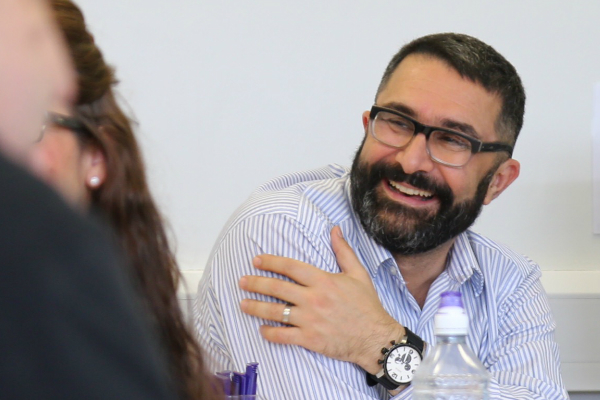
Smiling's good for you and for those around you, benefitting your wellbeing and mental health. Hormoz looks at the science behind the smile.
At our monthly marketing meeting, my colleague Jane asked, ‘do you realise it’s National Smile Month’? ‘Of course, I didn’t know that’, I said, as it relates to the importance of good oral hygiene. Not my area, as a personal development coach!
What followed though, was an interesting discussion about the scientific research behind what smiling, and laughter can do for us. This led to talking about positive thinking and stress reduction and the idea of this blog came about. It also ties in with the stresses of the pandemic and the fact that it’s Mental Health Awareness Week (10th–16th May) the strapline being ‘Surviving or Thriving’?
Jane, guest bloggers and I, have written several blogs about mental health some of which have been about lived experience of severe mental health issues and diagnosis.
So, inspired by the thought of a month of smiling, I am keeping this blog to the science behind the smile.
Smiling is good for your health
It reduces stress levels and heart rate. It releases endorphins which improves your mood, helps you to relax and even lowers your blood pressure. Aren’t you convinced already?! We may instinctively know this, and it has been said that smiling is contagious – read about the science.
Smiling may help you live longer
A compelling study at Wayne State University examined photos to classify the smiles of 230 baseball players. They found that the players with partial smiles lived on average two years longer than players who didn’t smile at all. Those who had the biggest smiles lived roughly seven years longer than then non-smiling ones.
Smiling in the workplace
This article from Forbes may be a bit dated, but its message of feeling happy at work certainly isn’t. Smiling makes you feel better, which has the ripple effect on how others feel and if that authentically shows on your face it sends the right messages to colleagues and leaders alike.
Practice!
Women smile more than men, but it’s no surprise that children win hands down (average 400 times a day vs adults 40–50). Ron Gutman’s TED talk, watched almost 6 million times, brings much of this science together to reveal that smiling not only has a measurable impact on us, but it’s also something we can develop as part of our own wellbeing and that of the people around us.
What I have found interesting in my research into smiles was the consideration of what a real smile is. Guillame Duchenne’s research talks about not just using the muscles around the mouth, but also the ones that cause the cheeks to raise and the eyes to smile. People who smile just with their mouths (think of the “say cheese” smile when taking a photo) don’t experience the same rewards as those who are smiling with their entire face. It makes sense and I can relate to the effect that certain smiles had in some of my darkest moments.
Watching the excellent BBC programme, Saved by a Stranger, I was reminded of a couple of important real smiles in my own life. One of the people whose story is featured talks about being in hospital and how a nurse who looked like an angel looked after him. ‘A stranger’s smile saved me’. How powerful is that?
I can relate.
Whilst I was supported by the boundless loving smiles of family and friends when I was hospitalised with mental health issues, it was some of the smiles from staff which had a lasting and memorable impact. Big Dave’s in particular.
I had completely shut down. I was unable to eat, communicate or function. No amount of care from family and friends lifted me out of it and then, somehow, Big Dave made me smile one night, his saucy humour somehow reaching the part of me that was locked away. And more than that, he turned my smile into laughter and, albeit briefly at first, lifted me from my depressed state to reveal to my loved ones that there was hope and that I was still there, somewhere.
I salute Big Dave. In a way he saved my life - the gift of laughter and smiling at the right time for a personal depression can not be underestimated. The science, and my lived experience, prove it.
Years later I bumped into him and my husband and I took the opportunity to tell him how much his infectious and caring ability to make me smile had changed our lives.
Just to end this blog the way I started it, I go back to my co-director Jane who shared this poem with me some time ago and again as she knew I would be writing this. It comes from a fantastic comedian Spike Milligan, a man who lived with depression for many years.
Read it and smile!